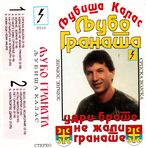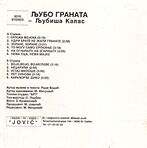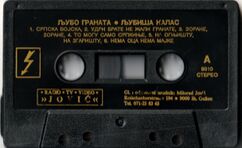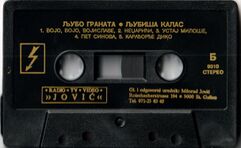Ljubo Granata: Difference between revisions
m (corrections) |
Generacide (talk | contribs) (More concise wording) |
||
| Line 16: | Line 16: | ||
}} | }} | ||
'''''Ljubo Granata''''' (Serbian Cyrillic: Љубо Граната), commonly referred to as ''Udri brate ne žali granate'', is the fourth studio album and first war-related | '''''Ljubo Granata''''' (Serbian Cyrillic: Љубо Граната), commonly referred to as ''Udri brate ne žali granate'', is the fourth studio album and first war-related albumby singer [[Ljubiša Kalas]]. It was released some time in 1993 by the Master Music Company. While not much is known about the album, it is assumed that the title's namesake was either a nickname for Kalas during the war or a namesake used for promotional purposes. The nickname has only ever been seen on this album. | ||
== Background== | == Background== | ||
| Line 22: | Line 22: | ||
==Release== | ==Release== | ||
''Ljubo Granata'' was released some time in 1993 by the Master Music Company | ''Ljubo Granata'' was released some time in 1993 by the Master Music Company, but it was also released by RTVJ for distribution in Switzerlans. Unfortunately, all known RTVJ releases do not include the final track "Karađorđe diko" in full, and the song fades out prematurely. | ||
Due to overlapping staff (mainly engineer Sead Lorbek and the arranger Miki Mitrović) and Master typically acquiring albums from other companies, it is speculated that [[Jugohit]] was the original distributor of the album, though there has been nothing to substantiate the claim. | |||
The song "Udri brate ne žali granate" would receive radio play and in present day, "Zorane, Zorane" would have a cult following as it is one of two surviving songs about Commander Zoran Borovina. With Master and RTVJ defunct and surviving uploads and a scan in low quality, it is assumed that master of the album, as well as other works published by Master are lost. On Christmas Day, 2022, user RandomAtribute20k would upload the album in better quality, though the last track would be prematurely cut off due to the Swiss version being used. | The song "Udri brate ne žali granate" would receive radio play and in present day, "Zorane, Zorane" would have a cult following as it is one of two surviving songs about Commander Zoran Borovina. With Master and RTVJ defunct and surviving uploads and a scan in low quality, it is assumed that master of the album, as well as other works published by Master are lost. On Christmas Day, 2022, user RandomAtribute20k would upload the album in better quality, though the last track would be prematurely cut off due to the Swiss version being used. | ||
Revision as of 19:45, 20 October 2023
| Љубо Граната | ||||
|---|---|---|---|---|
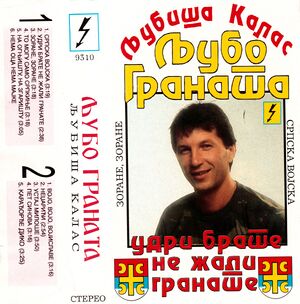 RTVJ release | ||||
| Studio album by | ||||
| Released | 1993 | |||
| Genre | Novokompovana | |||
| Length | 32:29 | |||
| Label | Master | |||
| Producer | М. Јовичић | |||
| Љубиша Калас chronology | ||||
| ||||
Ljubo Granata (Serbian Cyrillic: Љубо Граната), commonly referred to as Udri brate ne žali granate, is the fourth studio album and first war-related albumby singer Ljubiša Kalas. It was released some time in 1993 by the Master Music Company. While not much is known about the album, it is assumed that the title's namesake was either a nickname for Kalas during the war or a namesake used for promotional purposes. The nickname has only ever been seen on this album.
Background
Ljubo Granata's contents, while still patriotic in nature, has a darker tone compared to other albums made in its time. This would be the third time Ljubiša Kalas would work with lyricist Rade Vidić with the first being 1990's Ljubiša Kalas and the second being 1991's Crna žena. As a result, Kalas would sing "Karađorđe diko", a song that was also performed by Vojslav Tintor two years prior[1]. The song, "Nema oca, nema majke" was originally from the 1990 album, Ljubiša Kalas. Originally titled "Nema oca da pokosi travu",[2] it was included to fit the theming of the album, though the arranger would be left uncredited. The song, "Zorane, Zorane" would be about Zoran Borovina, a commander who was killed in action a year prior.
Release
Ljubo Granata was released some time in 1993 by the Master Music Company, but it was also released by RTVJ for distribution in Switzerlans. Unfortunately, all known RTVJ releases do not include the final track "Karađorđe diko" in full, and the song fades out prematurely.
Due to overlapping staff (mainly engineer Sead Lorbek and the arranger Miki Mitrović) and Master typically acquiring albums from other companies, it is speculated that Jugohit was the original distributor of the album, though there has been nothing to substantiate the claim.
The song "Udri brate ne žali granate" would receive radio play and in present day, "Zorane, Zorane" would have a cult following as it is one of two surviving songs about Commander Zoran Borovina. With Master and RTVJ defunct and surviving uploads and a scan in low quality, it is assumed that master of the album, as well as other works published by Master are lost. On Christmas Day, 2022, user RandomAtribute20k would upload the album in better quality, though the last track would be prematurely cut off due to the Swiss version being used.
Track listing
| No. | Title | Length |
|---|---|---|
| 1. | "Српска војска" | 3:19 |
| 2. | "Удри брате не жали гранате" | 2:38 |
| 3. | "Зоране, Зоране" | 3:18 |
| 4. | "То могу само српкиње" | 3:18 |
| 5. | "На огњишту, на згаришту" | 3:05 |
| 6. | "Нема оца, нема мајке" |
| No. | Title | Length |
|---|---|---|
| 1. | "Војо, Војо, Војиславе" | 3:16 |
| 2. | "Неџарићи" | 2:54 |
| 3. | "Устај Милоше" | 3:50 |
| 4. | "Пет синова" | 3:16 |
| 5. | "Карађорђе дико" | 3:35 |
| Total length: | 32:29 | |
- Time for "Nema oca, nema majke" is not listed
- Time for songs are slightly shorter than what is listed on the j-card.
Personnel
Writing
- Раде Видић - Аутор музика и текста
- М. Митровић - Аутор аранжмана
Production
- "АРТ"-Тонкси студио
- С. Лорбек- Тон-мајстор
- З. Кузмановић- Фото
- М. Јовичић- Продуцент
- М. Митровић- Рецензент
Variants
- Excellent audio quality
- Signature injected gold labels
- Signature black matte cassette
References
- ↑ Vojislav Vojo Tintor Karadjordje, diko Audio 1991 HD. Српска Архива. 28 September 2018. Retrieved 4 October 2023.
- ↑ Ljubisa Kalas - Nema oca da pokosi travu - (Audio 1990). Diskos Official. 31 August 2018. Retrieved 4 October 2023.
